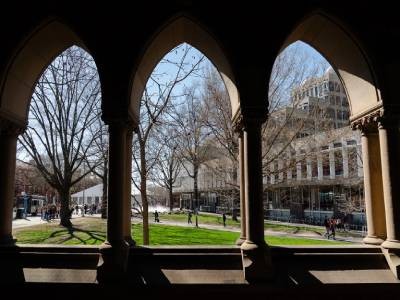
To receive tenure, US professors usually have to teach a certain number of courses and demonstrate accomplishments, such as obtaining research grants.Credit: Sky Nesher/Getty
Epidemiologist Candice Johnson was just getting started as a faculty member at Michigan State University (MSU) in East Lansing when US President Donald Trump took office. Since then, the US Centers for Disease Control and Prevention has cancelled a research contract that it had awarded her and that covers 5% of her salary. And the Trump administration effectively eliminated the US National Institute for Occupational Safety and Health, one of the main sources of funding in Johnson’s field.
How Trump’s attack on universities is putting research in peril
Johnson studies health disparities in the workforce, particularly in under-represented groups — a challenge given that Trump’s team is targeting what it has called “radical and wasteful” government spending on diversity, equity and inclusion (DEI) efforts. She’s worried about her future in research — and in particular, about her prospects of receiving tenure, a status in the US academic system that, once attained, guarantees researchers a faculty position that can be terminated only under extreme circumstances. Johnson’s ‘tenure clock’ has started, and she would normally be expected in the next five years to apply for tenure by demonstrating her accomplishments, including articles published and research grants secured.
But with the chaos brought by the Trump administration, “it seems to be an impossible thing to try to plan out the next five years not knowing what’s going to happen”, she says.
Johnson’s not alone. For other early-career researchers who spoke to Nature, the path to meeting standard tenure expectations now seems blocked, and they are looking to their universities for guidance on how to proceed. Since Trump began his presidency, US agencies such as the National Science Foundation (NSF) and the National Institutes of Health (NIH) that fund science have been slashing research awards that don’t align with the administration’s political ideology. They’ve also been freezing grants to universities with DEI programmes, or that the administration says have failed to protect their students from antisemitism. (Harvard University in Cambridge, Massachusetts, yesterday released reports initiated in 2024 by internal task forces that found evidence of this type of discrimination — as well as discrimination against Muslim and Arab students — and has pledged reform.)
These and other actions by the Trump team have left many researchers in limbo, waiting for funding that might never arrive, or scrambling to find other sources of financial support, to keep their teams intact.
Annika Barber, a molecular biologist at Rutgers University in New Brunswick, New Jersey, says that for many laboratories, including hers, even a three- to six-month gap in funding means that people have to be fired.
Ticking tenure clocks
Barber’s own funding, for studying the neural basis of decision-making in fruit flies, is secure at the moment: this month, the NIH approved a renewal of her existing grant, after initially asking her to stop any DEI-related work. She is part of a group in her faculty union exploring options to help researchers with ticking tenure clocks. Possibilities under consideration include bridge funding — whereby a university provides temporary financing until a long-term solution is found — and modifying the requirements of tenure. The group hasn’t yet made any specific requests of Rutgers, but Barber says its members think that tenure extensions — giving researchers more time to meet requirements — won’t work in this situation, because there’s no guarantee that funding will ever be restored.
Postdocs and PhD students hit hard by Trump’s crackdown on science
Johnson agrees that a tenure-clock extension probably won’t solve the problem. “I don’t know how we could still meet the tenure requirements” if US science budgets continue to be targeted, she says. Media outlets have reported that Trump will be requesting a reduction of about 40% in the NIH’s spending for fiscal year 2026, for example.
Nature contacted the universities of each researcher interviewed for this story to ask what steps they are taking to help scientists who are worried about attaining tenure. Only MSU, where Johnson works, answered.
Aron Sousa, dean of the College of Human Medicine at MSU, anticipates that disruptions to federal funding would justify extensions. The institution is discussing the possibility of shifting tenure requirements, he says, although no formal proposals are yet under consideration.
“We will have to change our standards if funding, and the kinds of research that funding allows, are no longer possible for faculty in this country,” he says.





